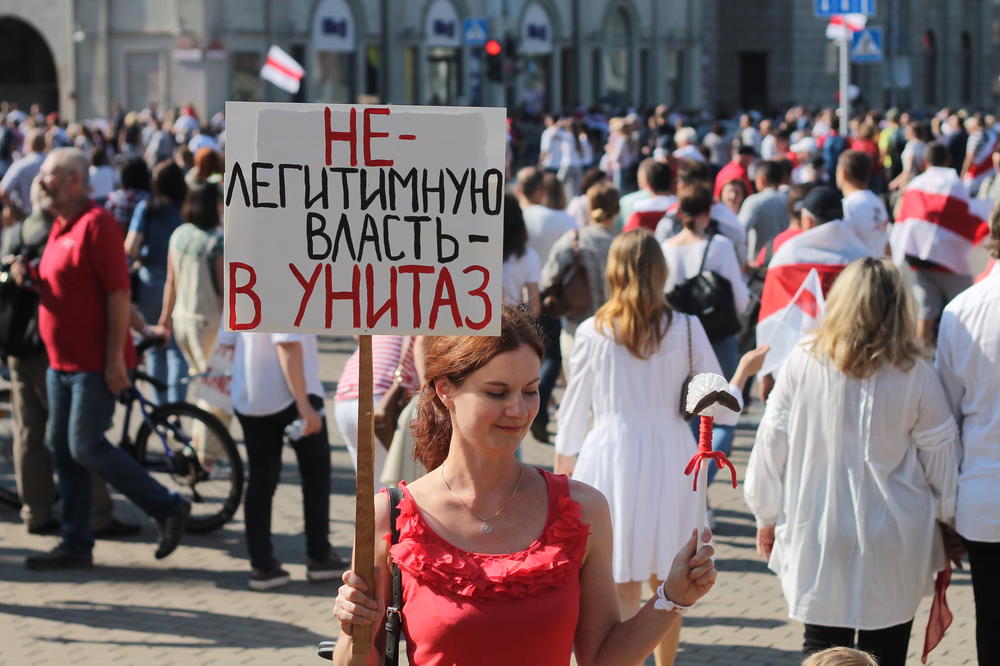Belarus: Women on the Frontline
by Keith Prushankin
№ 17/2020 from Oct 23, 2020
For the time being, the women of Belarus have galvanized the anti-Lukashenko opposition, thrown the repressive response into confusion, and won the support of the international community for their courage and determination in the face of grave dangers to life and liberty.
Minsk Protest Rally 30.08.2020
Image Credit: Natallia Rak (Flickr)
Elena Stempkovskaya showed the world what Belarusian women are made of.
To save her retreating battalion from encirclement, the 21- year-old Stempkovskaya stayed by her radio to direct artillery fire onto her own position, then continued firing her machine gun to cover her comrades’ retreat. She was killed on June 26, 1942, and was posthumously named a Hero of the Soviet Union; her country’s highest honor.
Despite this example (one of many), Belarusian President Alexander Lukashenko does not think much of Belarusian women.
The macho strongman has avoided elevating women to key ministerial positions, preferring instead to surround himself and his male entourage with a decorative group of young women chosen for their looks. Earlier in the election cycle, Lukashenko famously said that the constitution was not designed for women, and that after a month of power, a female president would collapse.
Seen in this light, Lukashenko’s reaction to the mass protests that arose following the contested and likely falsified election of August 9 2020, which saw Lukashenko officially win close to 80 percent of the vote over opposition candidate Svetlana Tikhonovskaya, was predictable.
The regime’s delegitimization of Tikhonovskaya and her other opposition colleagues, Maria Kolesnikova and Veronika Tsepkalo, as low-IQ Western puppets is as demonstrative of the disdain and disregard for the potential of women as it is the unique opportunity Belarusian women have in liberating their country.
It is telling that a portrait of a determined-looking woman, “Eva” by Chaim Soutine, has become a popular symbol of anti-regime resistance.
Challenges to a publicly visible norm such as women in politics have a clear and visible impact on the public discourse. By showing that they are politically conscious through political activism, Belarusian women are countering Lukashenko’s narrative of feminine fragility while simultaneously creating confusion and embarrassment among the police and security personnel tasked with putting down the protests.
While it is easy for police to beat and torture male demonstrators, the appearance of women in white dresses holding flowers inspires confusion and hesitation in even the most hardened security officers.
This embrace of femininity directly plays on the established gender stereotypes in Belarusian culture of women being vulnerable and in need of male protection. The regime’s repressive tactics, designed to address violent crowds of men, are not as easily applied, though some police officers seem to be overcoming their initial reluctance to use force against women.
This form of non-violent protest has a particular potency because of the historical basis of women taking active roles in Belarusian society. Belarus lost one third of its population during the Nazi occupation, leaving critical shortages of men to engage in the rebuilding of the country. Women filled the gaps, not only in the traditionally-female fields of childcare and education, but in industry, science, and government.
Indeed, the Chairperson of the Belarusian Supreme Soviet (the de-facto head of the Belarusian government) between 1938 and 1947 was Nadezhda Grekova, a career politician known as the “iron lady.” Sorry Sasha, she lasted a lot longer than one month.
Belarus’ anti-regime protests are an example of the strategic use of cultural attitudes to convey a political message, and their tactical deployment to blunt the use of traditional acts of repression.
The demonstrators have already gained significant international sympathy, as women carrying flowers are simply easier to like than men in balaclavas throwing stones.
This type of protest has the potential to appear in other countries, especially those with strong cultural discourses of misogyny and attitudes about the role of women in politics. A politically motivated group of women can surprise security forces, turning their tactics against them amid the moral confusion of repressing a person that both culture and upbringing demand protection.
The long-term viability of this tactic remains to be seen, especially amid increasing reports of police and security forces committing acts of violence against women both on the streets and in police custody. For the time being, at least, the women of Belarus have galvanized the anti-Lukashenko opposition, thrown the repressive response into confusion, and won the support of the international community for their courage and determination in the face of grave dangers to life and liberty.
Belarusian women have a proud history of fighting for their families and their country. Amid the Spring COVID-19 outbreak, Lukashenko refused to cancel the May 9 Victory Day parade because doing so would dishonor the memory of the fallen.
There can be no higher honor to Elena Stempkovskaya and the women who have shaped Belarus than for the Belarusian women of today to take their place in the building of democracy and equality in their country. Like before, Belarusian women are again stepping up to the frontline.
Keith Prushankin is a doctoral researcher with the SCRIPTS Program at Freie Universitaet Berlin, where he investigates democratic backsliding and populism in Central and Eastern Europe.

